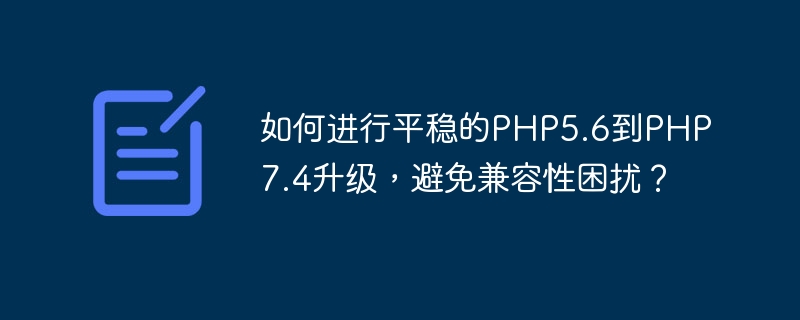

How to upgrade PHP5.6 to PHP7.4 smoothly to avoid compatibility problems?
With the continuous development of PHP technology, PHP 7.4 has become the mainstream PHP version, but many projects are still stuck in older versions, such as PHP 5.6. Upgrading to PHP 7.4 brings higher performance, more features, and better security. However, due to some incompatibilities between PHP 5.6 and PHP 7.4, the upgrade process may cause some confusion. This article will introduce how to perform a smooth PHP5.6 to PHP7.4 upgrade to avoid compatibility issues, and provide some code examples to help you understand better.
For example, the original MySQL extension has been removed in PHP7.4, and it is recommended to use MySQLi or PDO instead. If you are still using the original MySQL extension in your project, you need to modify the relevant code to use MySQLi or PDO.
The following is an example:
Original MySQL extension code:
$conn = mysql_connect($host, $user, $password);
mysql_select_db($database);
$result = mysql_query($query);
while ($row = mysql_fetch_array($result)) {
echo $row['column'];
}
mysql_close($conn);Use MySQLi or PDO instead:
$conn = new mysqli($host, $user, $password, $database);
$result = $conn->query($query);
while ($row = $result->fetch_assoc()) {
echo $row['column'];
}
$conn->close();For example, using undeclared properties or methods is no longer supported in PHP7.4. If there is such a situation in your code, you can add necessary declarations in front of variables, properties or methods, or check them before using them.
Here is an example:
Original code:
class Person {
public function sayHello() {
echo "Hello, " . $this->name;
}
}
$person = new Person();
$person->sayHello();Modified code:
class Person {
private $name;
public function setName($name) {
$this->name = $name;
}
public function sayHello() {
if (isset($this->name)){
echo "Hello, " . $this->name;
} else {
echo "Hello";
}
}
}
$person = new Person();
$person->setName("John");
$person->sayHello();In addition, you can also use the gradual upgrade method to divide the upgrade into multiple stages. Start by upgrading your project to a newer PHP version, such as PHP 7.0, and then gradually upgrade to PHP 7.4. This can help you better identify and solve potential problems and reduce the impact of upgrades.
Summary:
Upgrading the PHP version is an important and challenging task, especially from PHP5.6 to PHP7.4, which has a large gap. However, by following the above steps and considerations, you can perform a smooth upgrade, avoid compatibility headaches, and enjoy higher performance and more features after upgrading.
Make sure your project is PHP7.4 compatible by using tools to check for compatibility issues and update outdated features and syntax. Handling sensitive errors and warnings, testing and incremental upgrades can help you identify and resolve potential issues. Hopefully the code examples provided in this article will help you better understand how to perform a smooth PHP upgrade.
The above is the detailed content of How to perform a smooth upgrade from PHP5.6 to PHP7.4 to avoid compatibility issues?. For more information, please follow other related articles on the PHP Chinese website!




